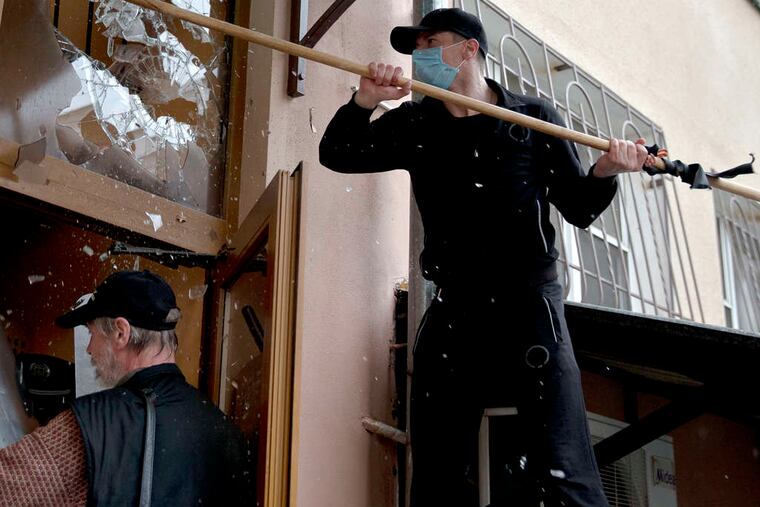Pro-Russia activists attack police station, free allies
DONETSK, Ukraine - Divisions deepened in Ukraine's third-largest city Sunday as pro-Russian militants attacked a police station in Odessa and freed 67 of their allies, while pro-Ukrainian activists gathered with sticks and clubs and vowed to defend the southern city from the kind of takeovers that have occurred in the eastern part of the country.

DONETSK, Ukraine - Divisions deepened in Ukraine's third-largest city Sunday as pro-Russian militants attacked a police station in Odessa and freed 67 of their allies, while pro-Ukrainian activists gathered with sticks and clubs and vowed to defend the southern city from the kind of takeovers that have occurred in the eastern part of the country.
The spread of violence to Odessa has raised the stakes dramatically in the Ukraine crisis, bringing the conflict between pro-Russian and pro-Ukrainian forces to the country's most important port. The failure of the police to prevent the violence has underlined how quickly Ukraine's security forces are losing control of their country.
Sunday's mayhem occurred two days after 46 people died in clashes and a fire in the city. The fact that most of those victims were pro-Russian activists has given their supporters a new, raw sense of grievance.
Hundreds of pro-Russian militants took part in the attack on the police station Sunday, aimed at releasing people arrested after Friday's fighting, according to witnesses and reporters on the scene.
The crowd chanted "Freedom for Odessa's heroes" and "Odessa rise up" as men wearing masks and carrying sticks and shields smashed windows and surveillance cameras, and forced their way into the compound. Police gave in and released the prisoners, sparking cheers and chants of "Odessa is a Russian town," witnesses said.
Odessa lies between the Crimean Peninsula, which Russia annexed in March, and the pro-Russian separatist region of Transnistria in Moldova, where Russia has a peacekeeping force. Concerns are mounting that Russia aims to take effective control of a huge swath of eastern and southern Ukraine, right up to Transnistria.
While Odessa has a sizable ethnic Russian minority - around 30 percent of the population - polls have found that most residents want to remain part of Ukraine. Ukraine's prime minister visited Odessa on Sunday, and he accused Russia of fomenting the unrest two days earlier. Calling it a "tragedy for all Ukraine," Arseniy Yatsenyuk also blamed a corrupt police force for failing to prevent the violence.
The trouble began Friday when a pro-Ukrainian rally in the city attended by thousands of soccer fans was attacked by pro-Russian separatists carrying sticks, shields and, in some cases, guns. Hours of street battles followed, and pro-Ukrainian activists said three members of their group had been shot and killed.
Later that evening, a pro-Ukrainian mob attacked people in a pro-Russian encampment, sending them running into a nearby building that the crowd then set on fire with gasoline bombs.
It was the worst day of violence in Ukraine since pro-Moscow president Viktor Yanukovych fled to Russia in February. Ukraine's government put the blame on Moscow, apparently for starting the violence.
"There were dozens of casualties resulting from a well-prepared and organized action against people, against Ukraine and against Odessa," Yatsenyuk told representatives of social organizations, according to the Reuters news agency.
He also tasked prosecutors with "finding all instigators, all organizers and all those that under Russian leadership began a deadly attack on Ukraine and Odessa," the Associated Press reported.
But for the pro-Russian side, the deaths represented oppression by the Kiev government and its supporters.
Sympathizers on Sunday toured the burned-out trade union building where the deaths occurred, residents said. Many cried and brought flowers and candles. Speakers called on a crowd that had gathered in a nearby square to seize government-owned buildings in the city. "All of Odessa hates you now," a man shouted at two young police officers.
Elsewhere, there were signs that backers of the pro-Western government in Kiev were not going to give up control of their city without a fight. Dozens of pro-Ukrainian supporters gathered on a main street carrying their own shields and clubs.
"We are never going to lose our city of Odessa to any lovers of the Russian tricolor flag," local leader Zoya Kozanzhy said by telephone. "Those who don't like Ukraine can go to Russia."
She said pro-Ukrainian activists in Luhansk, Donetsk, and other cities under separatist control "should organize their own movements and win the war."
Kozanzhy said the police are ineffective and it is up to people to fight for what they believe in.
"Both sides of this conflict have victims now, so it will take us many years before we go back to a peaceful life," she said.
Eugene Rumer, a Russia and Eurasia expert at the Carnegie Endowment for International Peace in Washington, said the risk of more bloodshed appeared to be rising.
"I fear this could lead to an even more widespread conflict and possibly civil war, if it's not one already. And it's dangerous because nobody's really in control," Rumer said.
Also Sunday, Ukrainian troops surrounded two rebel-held cities nearer the Russian border. But the soldiers appeared to hold back from a declared campaign to recapture the towns. Inside the cities of Slovyansk and Kramatorsk, heavily armed pro-Russian insurgents manned barricades, and residents formed lines at grocery stores and bakeries. In Donetsk, another pro-Russian stronghold, at least 1,000 people marched through town chanting, "Odessa will not be forgiven."
Russian President Vladimir Putin and German Chancellor Angela Merkel spoke by telephone late Sunday, the Kremlin said. Putin told Merkel that he wanted a direct dialogue between Ukraine's acting government in Kiev and "representatives of the southeastern regions of the country," the Kremlin said in a statement.